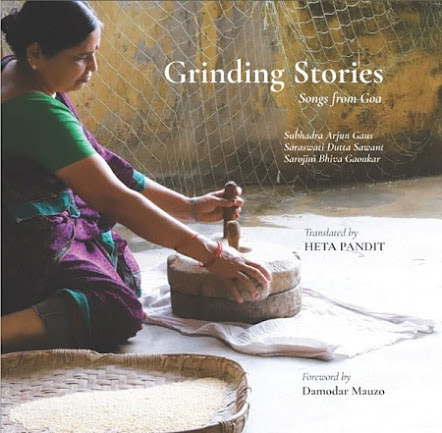Oviyos: The Tales of Women at Their Grinding Stones
Heta Pandit reproduces poignant tales connected with the process of using a grinding stone, still alive in many a Goan village. As these village women grind away, they sing songs that tell stories. Since this is usually a solitary job, the ladies have only these songs to make light their work.
There is a distinct manner in which this grinding is done, with the left leg out and the right leg folded in. By the side there will be a clay pot or winnowing fan with rice in it. The finger millet, hog millet and rice are more commonly ground in Goa. In states like Karnataka, Punjab, etc you might find wheat being ground. The stone is usually kept away and in an upright position when not in use. An old sari or a mat may be used to collect the flour.
The research into the songs connected with the grinding stone began with a temple dedicated to Shree Mauli Devi at the border of Maharashtra and Goa. The Kaavi art in the temple shows a depiction of Garuda with his mortal enemy, a cobra, in his claws. However, in this portrayal, Garuda had a benign expression and they were being blessed by Lord Vishnu. On asking Dr Rajendra Kerkar for the significance of this compassionate expression, he replied, ‘In Goa, you rescue your enemy.’
The songs sung over the grinding stone are called oviyos. Heta has collected 46 songs, translated them and compiled them in a book Grinding Stories: Songs from Goa which was released in 2018.
More songs began to come in, from young women who had learnt them from their grandmothers. So also, the grinding stories sung by the Christian Gowda community came to Heta’s knowledge. This was pertinent because the Portuguese government had banned the singing of Konkani songs in 1684. Under the ban, the songs may well have disappeared, keeping in mind that they were passed on from generation to generation orally. But they somehow survived and will be immortalised in Heta’s second volume of Grinding Stories: Songs from Goa by the end of 2020.
These songs are sung in Konkani, Marathi and the local dialect. These oviyos are sung mainly in agrarian communities, and it is the women that sing them. No male, not even a male child, is allowed to handle the grinding stone. ‘What is interesting is that the stone gives the singer the percussion, the rhythm, the energy to perform her job,’ says Heta.
This stone is all the more significant when we learn that women were not allowed to touch musical instruments made of leather or metal. They were not to touch tools as well. They could paint a wall with a rag soaked in lime, but the moment a brush was involved, a man of the house took over the job. ‘That is why they devised musical percussion instruments from the utensils that they used,’ says Heta.
Some of these women were married off at the age of 7 or 8 and dealing with the separation from their families must have been exceedingly traumatic. They rarely went back to their maternal home, which would be when they were pregnant for the first time. Their solitude, heartache and sorrows are also recorded in these songs.
The oviyos are not always sorrowful, however. Though the modern inventions of electricity and the mixer have narrowed the chances of this art enduring, the songs are still sung at the grinding stone during the haldi (turmeric) ceremony before Hindu weddings. The Christian Gowda community, for whom the haldi ceremony became the ros ceremony, has oviyos sung at the grinding stone as well. Heta says, ‘There’s a happy song where all the gods are invited to the wedding. There is also a little bit of teasing, where if an aunt says she cannot come to the wedding, you say “Don’t worry we will have more sweets for ourselves”. That kind of thing.’ Oviyos are composed of songs that impart wisdom too.
You can find out more about these stories and songs from Heta Pandit’s book Grinding Stories: Songs from Goa, which is available online and in bookstores.
(This article is based on a paper presented by Heta Pandit at Centro de Língua Portuguesa-Camões, Goa.)
(Originally published in March 2020)




Comments
Post a Comment